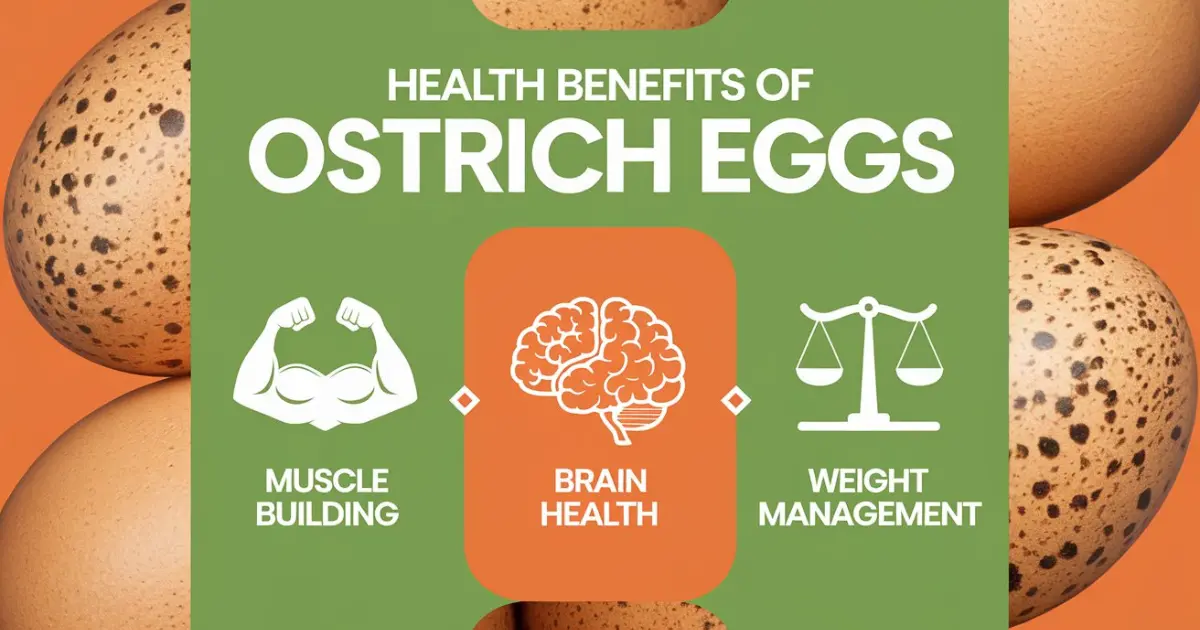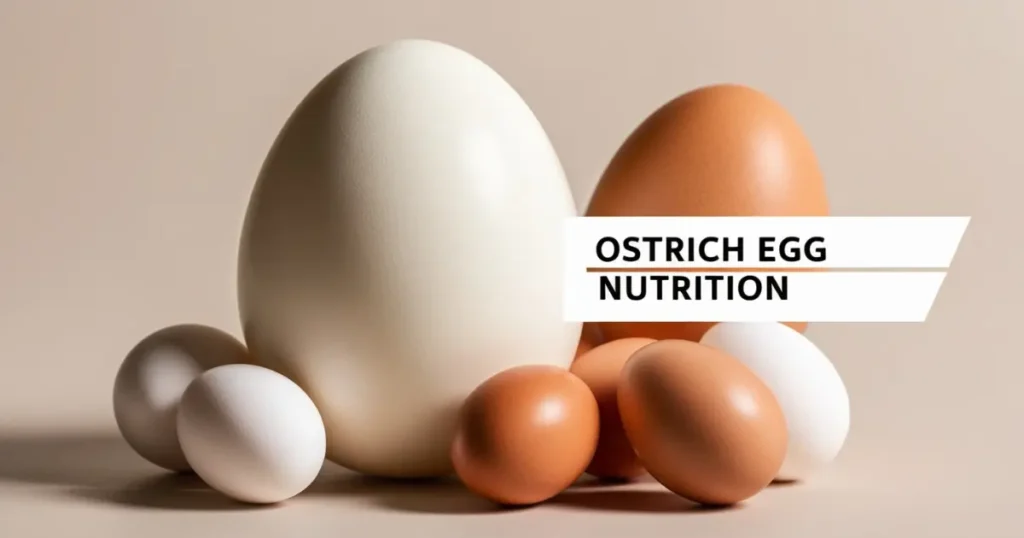Ostrich egg is rich in nutrition besides it’s unique size. These massive eggs provide a nutrient-dense alternative to chicken eggs, with numerous benefits that cater to diverse dietary needs. Ostrich eggs are a nutritious and versatile food, rich in protein, vitamins, and essential nutrients. An ostrich egg, weighing around 3 pounds (1.4 kg), is equivalent to about 24 chicken eggs in volume. Below is a detailed breakdown of the nutritional value, health advantages, and practical uses of ostrich eggs, along with ethical considerations and buying tips.
Nutritional Composition of Ostrich Eggs
Ostrich eggs are packed with essential nutrients that promote overall health. Here’s a breakdown about the ostrich egg nutrition:
| Nutrient | Per Ostrich Egg (~1.4 kg) | Per Chicken Egg (~50 g) |
| Calories | ~2000 kcal | ~70 kcal |
| Protein | ~200 g | ~6 g |
| Fat | ~150 g | ~5 g |
| Cholesterol | ~2000 mg | ~186 mg |
| Vitamin A | ~880 IU | ~270 IU |
| Iron | ~9 mg | ~1 mg |
| Omega-3 Fatty Acids | High | Moderate |
Key Insights:
- Ostrich eggs are excellent for meeting high protein requirements, suitable for athletes and bodybuilders.
- They are lower in cholesterol per serving compared to chicken eggs, making them heart-healthier when consumed in moderation.
- They provide more vitamins and minerals, including iron and vitamin A, which support vision and immune function.
Health Benefits of Ostrich Eggs

High Protein Content
With around 200 g of protein, ostrich eggs are ideal for muscle repair, growth, and overall body function. Because of this, fitness enthusiasts love them.
Lower Cholesterol
Despite their large size, ostrich eggs contain relatively less cholesterol per gram compared to chicken eggs. Because of that, it has reduced the chance of heart diseases.
Nutrient-Rich Profile
Ostrich eggs provide higher levels of vitamin A, E, and omega-3 fatty acids, which support brain health, skin elasticity, and cardiovascular health.
Weight Management
The high protein and low-calorie density keep you feeling fuller longer, making them a good addition to weight loss diets.
How to Cook and Incorporate Ostrich Eggs
Because of their size and thick shells, ostrich eggs require specific preparation techniques.
Boiling
Boiling an ostrich egg takes about 90 minutes. These boiled eggs are perfect for serving at gatherings or as meal prep for large families.
Scrambling
Use a large pan to prepare fluffy scrambled ostrich eggs. Adding fresh herbs and spices can enhance their flavor.
Baking
A single ostrich egg can be used in place of multiple chicken eggs in baking recipes. This makes them ideal for large-scale baking projects like cakes or soufflés.
Ethical and Sustainability Aspects

Ethical Farming Practices
Ostrich farming is often conducted on spacious free-range farms, promoting ethical treatment of the birds.
Lower Environmental Impact
Ostriches consume less feed and water relative to their output compared to other livestock, making their farming more sustainable.
Key Consideration: When purchasing ostrich eggs, look for farms that emphasize ethical and sustainable practices.
Where to Buy Ostrich Eggs
Ostrich eggs are less common than chicken eggs but are increasingly available in the U.S.:
- Specialty Food Stores: Look for high-end grocery stores that offer exotic food items.
- Online Retailers: Websites like Exotic Meats USA or Amazon Specialty Foods often sell ostrich eggs.
- Local Ostrich Farms: Buying directly supports sustainable and local farming initiatives.
Ostrich vs. Chicken Eggs Nutrition
| Attribute | Ostrich Egg | Chicken Egg |
| Size | ~1.4 kg | ~50 g |
| Calories | ~2000 kcal | ~70 kcal |
| Protein | ~200 g | ~6 g |
| Cholesterol | ~2000 mg | ~186 mg |
| Vitamins & Minerals | Richer profile overall | Moderate levels |
| Shelf Life | 2-3 months refrigerated | 3-5 weeks refrigerated |
To learn more about the health benefits of farm fresh chicken eggs, you can check the article linked below:
Are Ostrich Eggs Healthier than Chicken Eggs?
Yes, ostrich eggs are healthier in some ways, as they offer more protein, vitamins, and omega-3s per serving. For example, they contain higher amounts of Vitamin A and iron, promoting eye health and red blood cell production. However, they are calorie-dense (~2000 kcal per egg) and high in cholesterol, so moderation is essential. Overall ostrich egg has more nutrition than a chicken egg.
How Long Can Ostrich Eggs Be Stored?
Ostrich eggs can last up to 3 months when refrigerated due to their thick shells that help preserve freshness. If kept in a cool, dry area, they may last a few weeks. Proper storage ensures the best taste and safety.
Why Are Ostrich Eggs Expensive?
The high cost is due to their rarity, low production rates (40–60 eggs per ostrich annually), and the challenges of farming. Their limited availability and high demand for culinary and decorative purposes further drive up prices. Typically, they cost $25–$50 in the U.S.
Ostrich eggs are a nutritional powerhouse, ideal for those looking to diversify their diet or seek healthier alternatives. Their impressive size, high protein content, and unique taste make them a special addition to any culinary repertoire.



